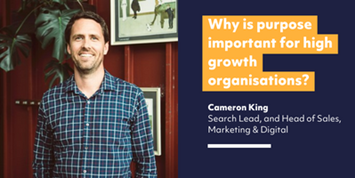Henry Martin has 20 years working in supply chain for many New Zealand companies, the majority in senior supply chain and transformation roles. He has a strong focus on always delivering high levels of customer service while transforming capability, process, logistics network, and the cost base. He is currently providing supply chain and transformation consulting services across New Zealand.
Tribe's supply chain lead, Dan Percival, caught up with Henry to chat about the industry.

From my experience, many people seem to fall into a supply chain career, then study and off they go…what was your experience Henry?
I studied economics, finance, accounting and forestry and when I left university, worked as an accountant (which I hated!), account management and then went into forestry valuation – a diverse background! I was responsible for the economics that drive the forest wood-flow planning and annual forestry valuation. This meant I had to get across the revenues and costs for the whole business to derive a valuation to support the balance sheet. After a few years, I got to understand the business pretty well. An opportunity came up to be the national S&OP manager. I knew very little about supply chain and S&OP but I did know this was a vital role in determining the plan (what roads to build, what forests to harvest, what logs to make, what customers to sell to etc) and delivering value to the business. I jumped at the chance and over the next 18 months managed the S&OP team. At the same time, I was going through an Oliver Wight Class A S&OP project and a new ERP implementation that combined GIS with SAP, with a JDE optimisation tool. I was very lucky to learn the theory from Oliver Wight and then see it go into practice with the ERP system and project team. I had been responsible for setting the strategy, now I was responsible for setting the monthly, weekly and daily plans to harvest and sell logs to deliver the strategy – it was awesome! I learnt more in those 18 months than five years at university!
Do you think qualifications in supply chain are essential? Can you learn most of it “on the job”?
I think my previous answer addresses this question but to add to it, most of the best people I have worked with had no supply chain qualifications. I have worked with great supply chain people who have come from manufacturing, driving trucks and managing warehouses, accountants and sales people. In saying that, I don’t think there were many supply chain qualifications available a few years ago – now there are some great options. I think learning the theory at university is useful as long as you’re willing to do the time in a warehouse, inventory and in a planning role. From my experience, if you have the right attitude and approach you can learn a lot of the technical skills on the job. Anyone interested in a supply chain career needs to have a very good understanding of both warehousing, inventory control and the key components of sales & operations planning. These can be learned on the job and require some “hard yards” in warehousing, inventory control, scheduling, planning and material planning.
I think that good supply chain people have a few key traits that help them stand out from others:
- Customer focus – always think about who the customer is for this process and who the ultimate customer is. This helps with end-to-end thinking
- Continuous improvement – always thinking about finding a way to improve and make service, cost or engagement better
- Commercial – always thinking about the P&L, the impact you are having on it
When my son was 10, he asked me what supply chain was. What would you say to a 10-year-old who asked you what you do all day!?
I think the best way to explain what I do is to take my sons to the supermarket and ask them what they think is involved in getting a bar of chocolate onto the shelf. It might take a while, but you can start a conversation about the people in the supermarket unpacking the box and re-filling the shelf and then work back to how the box got to the supermarket - from the supermarket’s DC, how it got to the DC, how the chocolate got into the box, where the wrapper and box came from, where the caramel came from etc. Supply chain is all about making that happen so the product is available on the shelf when we walk in, at a cost that ensures the business can make a decent margin.
How do you think the COVID-19 pandemic will affect supply chains in Aotearoa?
I think COVID-19 has been a wake-up call for many businesses that have seen supply chain as a cost centre for a long time. There has been a huge focus on reducing costs across the value chain, which in some cases has led to a reduction in the resilience of supply chains. Being able to keep operating and servicing customers during a crisis is a huge advantage and hard to value. I think smart businesses will see that investing in supply chain resilience will ensure they keep serving customers and keep one step ahead of their competition. Instead of being a cost centre, supply chain could be seen as revenue support!
Another change I have seen is increased collaboration across the supply chain. Smart businesses are getting more integrated with customers and suppliers to improve information flow to keep costs down and service high. Technology is critical to increasing collaboration and again requires an investment in people, process and systems.





